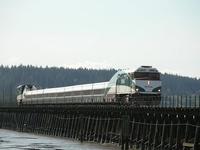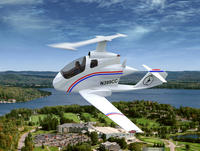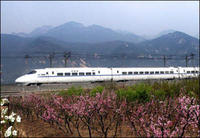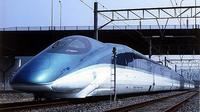-
Report warns Amtrak vulnerable

A new report by the DHS Inspector General warns that Amtrak is vulnerable to terrorist attacks, despite the $1 billion that has already been spent to bolster security; the inspector general found that DHS officials did not ensure that the money was being spent efficiently securing Amtrak’s most vulnerable stations resulting in security gaps
-
-
Mica cuts 40 percent from House transportation spending
Last Thursday, Representative John Mica (R-Florida) unveiled the House Transportation Reauthorization bill which would allocate $230 billion to infrastructure projects over the next six years; the bill has generated fierce criticism as it would cut transportation spending for America’s roadways by nearly 40 percent
-
-
RAILENIUM awarded 550 million Euro boost from French government
RAILENIUM, the European Institute for Technological Research in Rail Infrastructure, has been selected by the French government as a leading investment project and has been awarded 550 million Euros in funding; the equipment and research platforms that RAILENIUM will provide will be unique in Europe; this will include a 5 km rail test loop, a tramway test track, a fatigue-simulation track, running trial facilities, and service structures
-
-
New commuting method: Personal Aerial Vehicles

Researchers in Germany have an idea for solving the growing congestions in urban centers: a Personal Aerial Vehicles (PAVs) for traveling between homes and working places; the PAVs will fly at low altitude in urban environments, thus making it unnecessary to change current air-traffic control regulations
-
-
New Jersey lawmakers protest transit security cuts
On Tuesday Senator Frank Lautenberg (D-New Jersey) and Representative Rush Holt (D-New Jersey) urged lawmakers to restore funding for security measures to the nation’s railways; the House budget would cut funding for nine homeland security programs by 55 percent next fiscal year; in particular, funding to secure intercity passenger rail lines, freight trains, and mass transit systems would fall to $113 million down from $250 million, a 45 percent cut
-
-
Railroad protests $400 million in fines for smuggling drugs
Railroad companies are protesting nearly $400 million in fines for illegal drugs smuggled aboard its trains; under U.S. law, all shipping companies are subject to fines of $500 per ounce of marijuana and $1,000 per ounce of heroin or cocaine if U.S. Customs and Border Protection agents find drugs hidden in their cargo; Union Pacific argues that they are being punished for the actions of drug smugglers which they cannot control
-
-
New Jersey Transit unveils new terror text hotline
NJ Transit recently unveiled its new “Text Against Terror” initiative and is encouraging public transportation riders to report any suspicious items they see via text; the New Jersey transit system is the third largest in the nation with an estimated one million riders per day; New Jersey Transit officials are hoping to enlist the aid of its passengers in the fight against terror.
-
-
China reduces top speed on high-speed rail

On Monday Chinese officials lowered the top operating speed for its flagship bullet train citing safety concerns; China’s Railway Ministry will now run trains at 155 to 186 miles per hour on the Beijing to Shanghai line instead of 236 miles per hour as was originally planned; the recent announcement comes as part of broader set of changes to the Railway Ministry after Liu Zhijun, the previous minister, was fired for corruption and mismanagement in February
-
-
Making high-speed rail tracks safer

High-speed rail requires prestressed concrete railroad ties, as wooden cross ties are too flexible; for these ties to be effective, prestressing forces must be applied at a considerable distance before the rail load is applied; this is called the transfer length; to resist the heavy impacts the concrete ties utilize about twenty steel wires, each stressed to around 7,000 pounds; if the prestressed force is not properly transferred, failures can occur in the track
-
-
47,000 pedestrians killed in last decade
A recent study shows that walking in the United States has become increasingly dangerous; in the last ten years, nearly 50,000 pedestrians were killed and 688,000 injured in accidents; the study, conducted by Transportation For America (TFA), a coalition of transportation, environmental, and business groups, found that four of the top five most dangerous areas for pedestrians were located in Florida; 67 percent of pedestrian fatalities occurred on federal-aid roads, which are eligible for federal funding and have federal guidelines and oversight for their design
-
-
Senators outline long-term transportation spending plan
On Wednesday, a bipartisan group of senators announced that they had come to an agreement on a long-term transportation spending bill; since 2008, highway and transit construction programs have had an uncertain fate, but the proposed bill would allocate roughly $56 billion a year to highway and transit construction; it is unclear what the final bill will look like as the Senate, House, and executive branch each have diverging views on highway funding; funding the transportation bill will be no small feat; a two year Senate bill would require $12 billion in additional fuel tax revenues and a six year bill would require an addition $70 billion
-
-
Boston tries to bar hazmat trucks from downtown -- again
On average, 317 big trucks and tankers carrying hazardous materials travel through downtown Boston every day; in 2006 Boston had barred hazmat trucks from entering downtown, but federal officials voided the restrictions last year, saying Boston did not show sufficient cause to justify the restrictions; the city commissioned a study on the issue, which recommended diverting hazmat traffic from downtown to a route which will see the truck take the already-congested Route 128, which cuts through Boston’s western suburbs; businesses and cities along the proposed rout object
-
-
How safe are U.S. railroads?
Following the revelation that al Qaeda had aspired to attack U.S. railways, security experts, the media, and lawmakers have turned their attention to improving security for American trains; in a recent interview with CNN, Brian Michael Jenkins, the director of the Mineta Transportation Institute’s (MTI) National Transportation Security Center of Excellence, discussed the current state of railway security, how realistic creating an airline style screening system for railroads would be, and what measures need to be taken to secure railroads; to realistically improve rail security in a cost effective manner, Jenkins urged passengers to begin taking a more active role; Jenkins also urged the United States “to be more realistic about risk”
-
-
Schumer wants more security funding for railroads
Following revelations that Osama bin Laden had been considering attacks on American railroads, Senator Chuck Schumer (D - New York) is requesting additional funding for security measures to protect U.S. train infrastructure; Schumer wants to use the money to conduct more comprehensive track inspections and to monitor railway stations throughout the United States; he has also called for the creation of an Amtrak “No Ride List” similar to the “No Fly List” that is designed to keep suspected terrorists from boarding airplanes
-
-
Hazmat trucks stopped in downtown Dallas
City of Dallas police are enforcing city laws prohibiting truckers from hauling hazardous materials through downtown Dallas; last week the police stopped twenty-seven trucks in downtown Dallas, carrying, among other things, cyanide, gasoline, and dynamite
-
- All
- Regional
- Water
- Biometrics
- Borders/Immig
- Business
- Cybersecurity
- Detection
- Disasters
- Government
- Infrastructure
- International
- Public health
- Public Safety
- Communication interoperabillity
- Emergency services
- Emergency medical services
- Fire
- First response
- IEDs
- Law Enforcement
- Law Enforcement Technology
- Military technology
- Nonlethal weapons
- Nuclear weapons
- Personal protection equipment
- Police
- Notification /alert systems
- Situational awareness
- Weapons systems
- Sci-Tech
- Sector Reports
- Surveillance
- Transportation
Advertising & Marketing: advertise@newswirepubs.com
Editorial: editor@newswirepubs.com
General: info@newswirepubs.com
2010-2011 © News Wire Publications, LLC News Wire Publications, LLC
220 Old Country Road | Suite 200 | Mineola | New York | 11501
Permissions and Policies
Editorial: editor@newswirepubs.com
General: info@newswirepubs.com
2010-2011 © News Wire Publications, LLC News Wire Publications, LLC
220 Old Country Road | Suite 200 | Mineola | New York | 11501
Permissions and Policies
